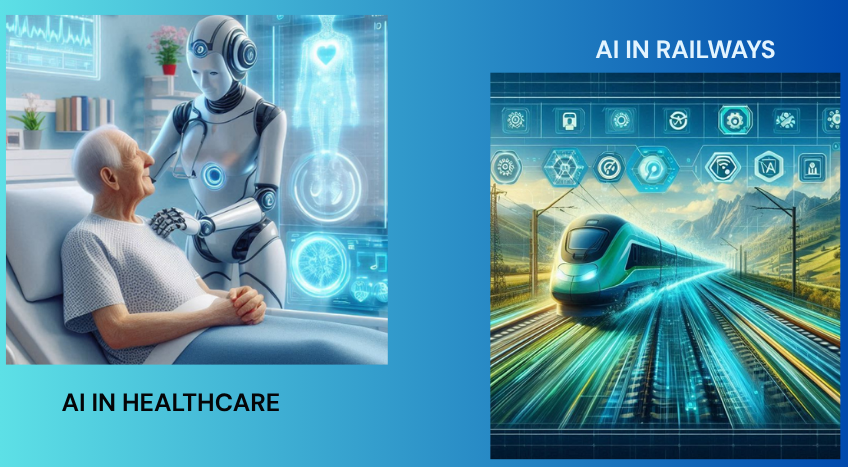
- 📌 The Vision of Digital India and AI Governance
- 🏥 AI in Indian Healthcare: Saving Lives with Data
In the last decade, India has witnessed a massive digital revolution. From the rollout of Aadhaar to the Digital India mission, the government has consistently worked towards leveraging technology for better governance. Today, the focus is shifting towards AI-based public service transformation in India, a vision that combines cutting-edge innovation with citizen-centric services. At AixCircle, we believe artificial intelligence is not just a technological advancement but a catalyst for inclusive governance.
In this blog, we will explore how artificial intelligence in Indian government projects is reshaping healthcare, transport, smart cities, and citizen services, making India a global leader in digital governance.
📌 The Vision of Digital India and AI Governance
The Digital India and AI governance initiative has created a strong foundation for AI-driven public services. The government has launched the National AI Strategy under NITI Aayog, focusing on five key sectors: healthcare, agriculture, education, smart cities, and transport.
- AI Governance Goals:
- Improve efficiency in public service delivery.
- Bridge the digital divide.
- Enable real-time policy making with data-driven insights.
- Empower citizens through transparent and accessible services.
By embedding AI into governance, India is transforming bureaucracy-heavy systems into agile, citizen-friendly platforms.
🏥 AI in Indian Healthcare: Saving Lives with Data
One of the most significant areas of AI-based public service transformation in India is healthcare. The country’s vast population and diverse health challenges make AI integration essential.
Key Projects and Initiatives:
- AI in Disease Prediction: AI-driven platforms predict disease outbreaks like malaria, dengue, and COVID-19. This enables governments to deploy healthcare resources proactively.
- Telemedicine and AI Chatbots: States like Andhra Pradesh are using AI-powered teleconsultation platforms to reach rural patients.
- AI in Radiology: AI tools detect diseases such as tuberculosis and cancer from X-rays and scans faster than traditional methods.
- Drug Discovery: Indian research institutes use AI models to accelerate vaccine and drug development.
The integration of AI in Indian healthcare and transport systems is not only saving lives but also reducing costs and improving accessibility.
🚆 Smart Railways: AI for Efficient Transport
The Indian Railways, one of the world’s largest rail networks, has embraced artificial intelligence in Indian government projects to improve efficiency and passenger experience.
- Predictive Maintenance: AI algorithms predict track failures and mechanical issues before they cause accidents.
- Smart Ticketing: Facial recognition and AI-driven ticketing systems speed up boarding processes.
- Passenger Flow Analysis: AI-based cameras analyze crowd density to manage station security and prevent stampedes.
- Energy Optimization: AI is helping Indian Railways save energy by optimizing fuel usage and scheduling.
Through these initiatives, India is demonstrating how AI in Indian healthcare and transport systems can significantly impact the daily lives of millions.
🌆 Smart City Planning Using AI
India’s Smart Cities Mission has integrated smart city planning using AI to create sustainable, data-driven urban centers.
Applications of AI in Smart Cities:
- Traffic Management: AI-powered cameras monitor and control traffic signals to reduce congestion.
- Waste Management: Smart bins use AI sensors to optimize garbage collection routes.
- Water and Power Supply: AI predicts usage patterns, preventing shortages and reducing wastage.
- Surveillance and Security: AI-based CCTV systems improve crime detection and emergency response.
Cities like Bengaluru, Pune, and Hyderabad are leading the way in AI-driven smart city innovations. This proves that AI-based public service transformation in India is not a distant dream but a reality already taking shape.
📑 Document Digitization and AI in Governance
The government has historically struggled with paper-heavy processes. Now, with AI, digital governance is becoming more efficient.
- Document Digitization: AI tools scan and classify millions of government records, making them accessible online.
- Natural Language Processing (NLP): AI chatbots in local languages assist citizens in accessing services such as PAN, Aadhaar, and tax filings.
- Grievance Redressal: AI-powered platforms route citizen complaints to the right department, reducing delays.
- Policy Formulation: Data analytics powered by AI helps policymakers analyze real-time trends and create impactful policies.
This digital shift underlines how artificial intelligence in Indian government projects is ensuring faster, corruption-free, and transparent governance.
🌾 AI in Agriculture and Rural Services
While urban India embraces smart city planning using AI, rural India is seeing remarkable progress in agriculture.
- Crop Monitoring: AI satellites track soil health and predict crop yields.
- Pest Control: AI-driven apps alert farmers about pest risks in advance.
- Market Forecasting: AI predicts crop prices, helping farmers make better selling decisions.
- Microfinance and Loans: AI algorithms evaluate farmer creditworthiness and reduce risks for rural banks.
These innovations showcase how AI-based public service transformation in India is helping farmers increase income while reducing losses.
🏛 Success Stories: AI in Indian Government Projects
Several state and national-level initiatives highlight the progress of artificial intelligence in Indian government projects:
- eSanjeevani (National Telemedicine Service): AI-powered consultations for rural and urban citizens.
- IRCTC AI Chatbot (AskDISHA): Assists passengers with booking, refunds, and queries.
- Delhi Traffic Police AI Cameras: Automated challans for traffic violations.
- Bhuvan Platform (ISRO): AI-based geospatial mapping for disaster management.
These initiatives reflect India’s strong commitment to digital governance and AI policy implementation.
🚀 Challenges in AI-based Public Service Transformation in India
Despite the progress, challenges remain in achieving full-scale AI-based public service transformation in India:
- Data Privacy: Concerns about citizen data security.
- Skill Gap: Need for AI training among government officials.
- Infrastructure: Limited connectivity in rural areas.
- Policy Framework: Need for stronger AI regulations and ethics guidelines.
Addressing these challenges is crucial for scaling AI initiatives nationwide.
🔮 The Future of AI in Indian Public Services
The next decade will be defined by AI adoption across every aspect of governance. From AI in Indian healthcare and transport systems to smart city planning using AI, the vision is clear: faster, smarter, and more inclusive public services.
At AixCircle, we believe India’s AI revolution is a blueprint for the world. By aligning innovation with social good, India is showing how AI can empower every citizen.
Final Thoughts
The journey of AI-based public service transformation in India is still unfolding, but its impact is undeniable. By leveraging artificial intelligence in Indian government projects, India is building a future where governance is not just digital, but intelligent.
From predicting diseases and managing railways to designing smarter cities and empowering farmers, AI is becoming the backbone of India’s governance framework. With strong policies under Digital India and AI governance, the country is ready to lead the world in public sector AI innovation.
At AixCircle, we will continue to explore, share, and celebrate how AI is transforming lives and building a stronger, more connected India.

